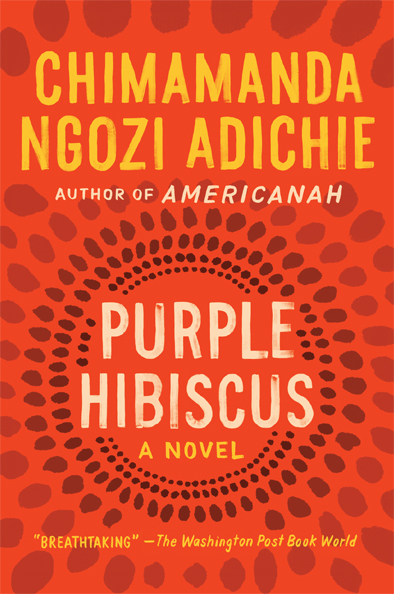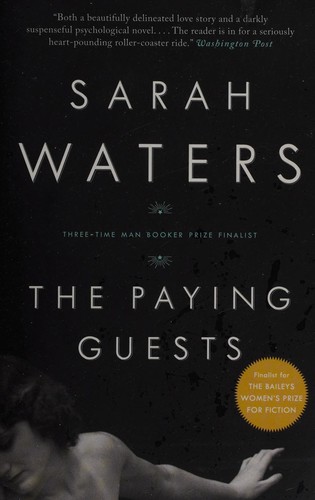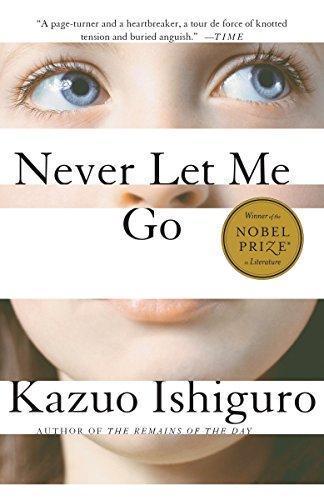mauami rated Purple hibiscus: 5 stars

Purple hibiscus by Chimamanda Ngozi Adichie
In the city of Egunu, Nigeria, fifteen year-old Kambili and her older brother Jaja lead a somewhat cloistered life. Their …
I read in Czech, Polish and English. Mix & match of all genres.
This link opens in a pop-up window

In the city of Egunu, Nigeria, fifteen year-old Kambili and her older brother Jaja lead a somewhat cloistered life. Their …

"The year is 1922, and London is tense. Ex-servicemen are disillusioned, the out-of-work and the hungry are demanding change. In …
It has captured me and wouldn't release until I've found The Jester too. Honestly, I don't understand why this book receives such mixed reviews. The hunt for an elusive bug is a proper thriller, the story is well-paced and, most of all, it's the most accurate depiction of the reality of software development I've read in fiction so far. It's a solid novel I'd easily recommend even to non-programmers.
It has captured me and wouldn't release until I've found The Jester too. Honestly, I don't understand why this book receives such mixed reviews. The hunt for an elusive bug is a proper thriller, the story is well-paced and, most of all, it's the most accurate depiction of the reality of software development I've read in fiction so far. It's a solid novel I'd easily recommend even to non-programmers.
Cormac McCarthy's tenth novel, The Road, is his most harrowing yet deeply personal work. Some …
What's left when nothing's left? This book hardly gives the answer. Or maybe it does, but I don't like that answer. I knew what kind of road this novel takes a reader to, yet afterwards I kept being haunted by some of the scenes. Don't read it when you're hopeful and want to keep feeling that way. Read it when you feel ready to take a look at somewhere really dark.
What's left when nothing's left? This book hardly gives the answer. Or maybe it does, but I don't like that answer. I knew what kind of road this novel takes a reader to, yet afterwards I kept being haunted by some of the scenes. Don't read it when you're hopeful and want to keep feeling that way. Read it when you feel ready to take a look at somewhere really dark.
Mycelium was recommended to me as an example of a good Czech sci-fi. It's one of those series whose publishing span lasted years and many of the early fans got detached from the story waiting for its finish and weren't that eager to reread it once the last piece was published a year or so ago.
As you can imagine, there's a lot of fungi activity in the book. I won't go too deep into the plot not to reveal too much, but I find the idea of employing mycelial structures to enable the civilization jump forward one of the stronger parts of the series. The layers of conflicts were set nicely: the personal one between the protagonists, between the Akkutlix church and scientific approach to the available powers, and the further development in the wide universe. On the weaker side there would be the characters and their relationships. …
Mycelium was recommended to me as an example of a good Czech sci-fi. It's one of those series whose publishing span lasted years and many of the early fans got detached from the story waiting for its finish and weren't that eager to reread it once the last piece was published a year or so ago.
As you can imagine, there's a lot of fungi activity in the book. I won't go too deep into the plot not to reveal too much, but I find the idea of employing mycelial structures to enable the civilization jump forward one of the stronger parts of the series. The layers of conflicts were set nicely: the personal one between the protagonists, between the Akkutlix church and scientific approach to the available powers, and the further development in the wide universe. On the weaker side there would be the characters and their relationships. That there are no likeable characters - that's alright. But if I drank a shot every time I read about a female character yelling at someone, I'd not remember that half a year it roughly took me to read the series. Even more frustrating was the 1-dimension of the female characters, who didn't have any personality other than being unconditionally supportive of their men. Just giving them professions like sculptor or professional sportswoman didn't do the trick, sorry. I believe more editorial work, including cutting some content, would benefit the series overall.
Would I read it again? No. Would I recommend it to others? Not likely.

Never Let Me Go is a 2005 dystopian science fiction novel by the British author Kazuo Ishiguro. It was shortlisted …
This series feeds my hunger for widely scoped epic stories, spanning through generations and different life conditions. It's an excellent introduction to the history of the Czech Silesia, probably completely unknown in Poland and only in fragments in the Czech Republic. Both factual and emotional, I found myself having a lump in my throat quite a few times. I'd love to see it in Polish bookshops.
This series feeds my hunger for widely scoped epic stories, spanning through generations and different life conditions. It's an excellent introduction to the history of the Czech Silesia, probably completely unknown in Poland and only in fragments in the Czech Republic. Both factual and emotional, I found myself having a lump in my throat quite a few times. I'd love to see it in Polish bookshops.
I hated how Ishiguro plays with reader's expectations. I loved how Ishiguro plays with reader's expectations.
I hated how Ishiguro plays with reader's expectations. I loved how Ishiguro plays with reader's expectations.
One of the first stories going into the daily life of the vast majority of women up to 100 years ago. Reading leaves one in awe, it's not so long ago, grandmothers could tell - yet the stories were never heard. Reading leaves one with understanding why the stories were never told. Yet, this powerful piece of puzzles of my-our history had to reach the surface. I'm glad it did.
There's a particularly interesting chapter about the first folk adult schools on the Polish territory. Built and led in the spirit of solidarity, they educated people who then went back to their villages and changed the ways folks lived (both culturally and practically: by introducing new tools, seeds and agricultural processes). As always, the church and the nationalists didn't like the grassroot empowerment. It's always dangerous to let people believe it's them who's got the power over their lives. …
One of the first stories going into the daily life of the vast majority of women up to 100 years ago. Reading leaves one in awe, it's not so long ago, grandmothers could tell - yet the stories were never heard. Reading leaves one with understanding why the stories were never told. Yet, this powerful piece of puzzles of my-our history had to reach the surface. I'm glad it did.
There's a particularly interesting chapter about the first folk adult schools on the Polish territory. Built and led in the spirit of solidarity, they educated people who then went back to their villages and changed the ways folks lived (both culturally and practically: by introducing new tools, seeds and agricultural processes). As always, the church and the nationalists didn't like the grassroot empowerment. It's always dangerous to let people believe it's them who's got the power over their lives. I'd love to see the full story of the popular educational movements in a separate book.
I can't wait to see it translated.